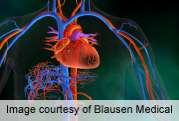Evidence-based therapies are increasingly being used to treat patients with ST-segment elevation myocardial infarction and non-ST-segment elevation myocardial infarction, according to research published in the Feb. 1 issue of The American Journal of Cardiology.
(HealthDay)—Evidence-based therapies are increasingly being used to treat patients with ST-segment elevation myocardial infarction (STEMI) and non-ST-segment elevation myocardial infarction (NSTEMI), according to research published in the Feb. 1 issue of The American Journal of Cardiology.
Emily C. O'Brien, Ph.D., M.S.P.H., of the University of North Carolina at Chapel Hill, and colleagues used data from the Atherosclerosis Risk in Communities Community Surveillance Study to examine trends from 1987 to 2008 in the use of 10 medical therapies and procedures for STEMI and NSTEMI for 30,986 cases of definite or probable myocardial infarction.
The researchers found that, for both STEMI and NSTEMI, increases were noted in the use of angiotensin-converting enzyme inhibitors (6.4 and 5.5 percent, respectively); antiplatelet therapy other than aspirin (5.0 and 3.7 percent); lipid-lowering drugs (4.5 and 3.0 percent); and beta-blockers (2.7 and 4.2 percent). Smaller increases were noted in the use of aspirin (1.2 and 1.9 percent) and heparin (0.8 and 1.7 percent). For patients with STEMI, use of thrombolytic agents and the number of coronary artery bypass graft procedures decreased.
"This is the first study to present long-term trends in in-hospital treatment for patients with STEMIs and those with NSTEMIs using validated clinical data," the authors write. "We observed an increase in the use of six of seven medications over the study period in patients with STEMIs and those with NSTEMIs."
More information:
Abstract
Full Text (subscription or payment may be required)
Journal information: American Journal of Cardiology
Health News Copyright © 2013 HealthDay. All rights reserved.






















